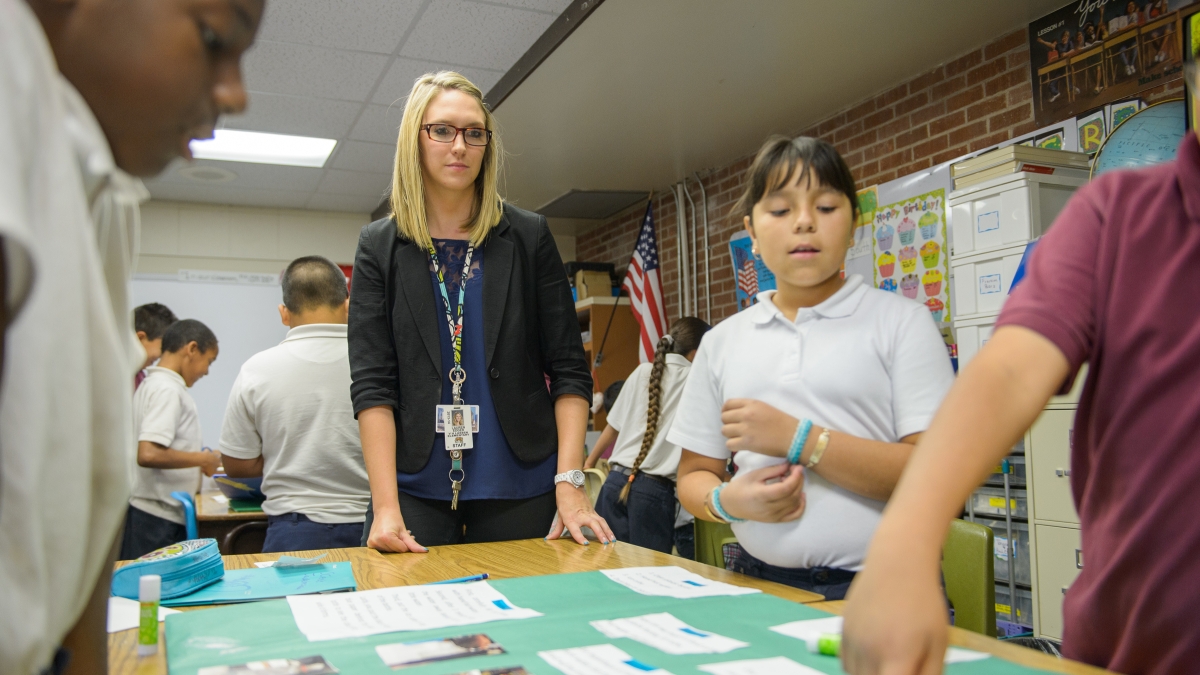ASU education initiatives win high-impact grants

The Mary Lou Fulton Teachers College at Arizona State University has been awarded four major grants from the Department of Education to expand on faculty and researchers' success in meeting the learning and access needs of students across Arizona.
With the support of $17 million in federal funds, college faculty are looking to improve educational outcomes for English Language Learners (ELLs) in Arizona; test innovative approaches for helping low-income ASU freshmen succeed; and prepare, graduate and support American Indian educators teaching students in the San Carlos Apache Nation.
Funding will also support an in-depth evaluation of the college's much-lauded iTeachAZ student teaching program.
The grants confirm ASU's proven ability to improve learning outcomes and the lives of students, said Mari Koerner, Teachers College dean.
“These projects underscore not only the brilliance, but the passion of our educational researchers who won these competitively awarded grants in a concerted effort to move our mission forward,” said Koerner. “The entire college is focused on our goal of enabling all students to reach their potential, regardless of age, nationality or socioeconomic status."
English Language Learners
Approximately 30 percent of Arizona's population is Hispanic.
Addressing the acute need for highly qualified English Language Learner (ELL) teachers in state, Teachers College will expand its successful iTeachAZ senior-residency program to develop iTeach ELLs – the college's initial grant project, funded by $11.5 million.
Titled “Integrating STEM, Literacy, and Language to Prepare All Teachers to Teach ELLs,” the cross-disciplinary project calls for redesigning college math and science content courses to promote language and literacy development skills that future teachers can apply immediately in classrooms.
Currently, Teachers College graduates about 30 students annually certified to teach ELLs. This project will equip all undergraduate majors in elementary education, special education and early childhood/early childhood special education with ELL teaching expertise.
“This is not just for a special group of education majors,” explains Pamela Harris, assistant division director for teacher preparation at the college and lead author of the grant. “This is, instead, taking our elementary education majors and training all of them on how to use STEM (science, technology, engineering and math) content to successfully teach ELLs.
“The beauty of this project is that it will help all preK-8 students, even if they are not English Language Learners, because any student who struggles to read will benefit from some of the same strategies," she adds.
Additionally, the five-year grant will help ensure new teacher success by pairing Teachers College graduates with experienced mentor teachers on-site – including an intensive iTeach ELLs camp and coaching during the first year of teaching.
The project is on track to become a national model for boosting ELL learning outcomes.
College access, success
A second grant totaling $4 million is aimed at increasing college access and enhancing learning for low-income students.
“There is a lot of excitement around this grant,” said Jeanne Wilcox, professor and associate dean of research for Teachers College. “It supports ASU’s reputation for higher education innovation by allowing us to pilot a competency-based college education where students develop critical thinking and problem solving abilities needed in today’s workplace.”
The signature innovation includes a curriculum redesign, asking interdisciplinary faculty members across the university to collaborate in offering projects that are mapped to competencies students are expected to master. This allows students – many of them the first in their family to attend college – to achieve learning outcomes that meet requirements for multiple courses within a single project.
In addition, ASU and the Phoenix Union High School District are collaborating to implement an academic program that gives high school seniors a head start on college. The partnership will offer seniors and their parents support networks for academic advising, financial planning and transitioning to the ASU campus the student plans to attend.
“We want to begin to close the degree attainment gap for students from low-income backgrounds when compared to their more advantaged peers,” Wilcox said.
American Indian teachers
More than $1 million in federal funding will support Teachers College efforts to place American Indian teachers in schools serving the San Carlos Apache Nation.
Fifteen American Indian students from Eastern Arizona College majoring in early childhood education will transition from the community college into ASU’s undergraduate degree program to spend their junior and senior years in San Carlos, Arizona, where they will complete their ASU coursework, junior-year practicum and senior-year iTeachAZ residency assisted by an on-site coordinator.
The ASU education graduates will become dual-certified for early childhood and special education teaching, and will continue to receive on-site support in their first year of teaching.
“I feel as though there are 15 people out there who may not know how we are going to change their lives forever,” said Cory Hansen, Teachers College interim director of teacher preparation and associate professor. “And the impact on the children and their families in San Carlos is going to be amazing.”
iTeachAZ
Finally, a three-year grant for $550,000 will underwrite a longitudinal evaluation of the college’s teacher preparation program and senior-year residency known as iTeachAZ. The award enables the college to examine three significant areas: the effectiveness of iTeachAZ on college graduation rates; the contribution of previous iTeachAZ reforms to teacher preparedness; and the impact of iTeachAZ-trained teachers on the academic achievement of their students.
The new grant also follows the progress of all iTeachAZ graduates, not just a subgroup, increasing the number of participants from 2,000 to more than 3,000 with varying levels of iTeachAZ experience. In addition, it includes data-sharing with both the Arizona Department of Education and the college’s 30 school district partners to gain timely information about iTeachAZ graduates.
Written by Judy Crawford